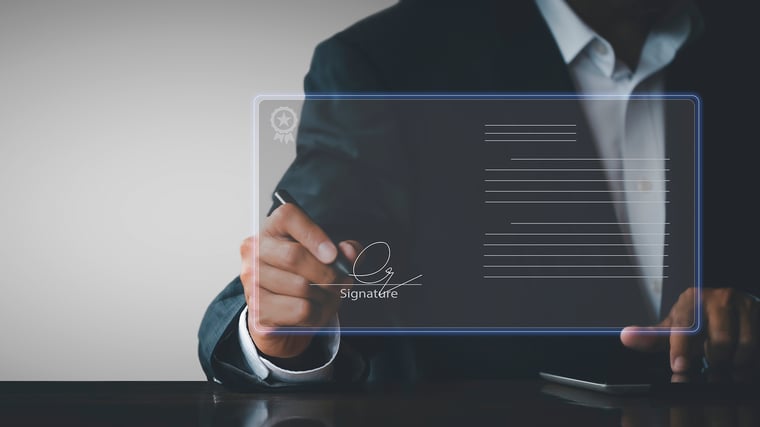Blockchain and Commercial Real Estate

Most people will have heard of the concept of blockchain and may have a basic understanding of what it entails. Until recently, the term ‘blockchain’ was synonymous with cryptocurrencies, such as Bitcoin. Most people will associate blockchain with cryptocurrencies such as Bitcoin and Ethereum.
However, as this article will explain, blockchain technology has far broader implications than merely cryptocurrencies and impacts transactions in various businesses. The commercial real estate industry is no exception.
This article will look at the key drivers that have encouraged the take up of blockchain technology in the commercial real estate industry and some specific examples.
Index
- What is blockchain technology?
- How is blockchain used in commercial real estate in the US and Canada?
- Due diligence in real estate transactions
- Peer-to-peer rentals
- Smart contracts
- Blockchain and the ‘tokenization’ of commercial real estate
- What does tokenization mean in the commercial real estate sector?
- Increased accessibility to commercial real estate investments
- Raising capital and increasing the pool of investors
- No geographical limits for investors or sponsors
- Hands-free ownership of a portfolio of international commercial real estate
- The future of blockchain in the commercial real estate industry
What is blockchain technology?
Blockchain, in broad terms, operates as a platform for transactions anywhere across the globe. The most obvious example is Bitcoin, where blockchain technology enables market participants to safely buy, sell and store their Bitcoin or other cryptocurrencies. It does this through what is known as ‘distributed ledger technology. A distributed ledger enables users to record and share their own ‘personal ledger,’ which can then be verified and shared with other users. This ledger can record all things, not simply the value of a particular cryptocurrency, but any asset with value.

Hence blockchain is often referred to as the ‘internet of value. This ‘value’ can refer to any asset - including money, securities, tokens, or even title to land or rights under a lease. And ‘value’ can also refer to ownership of information - such as personal data or financial records.
One crucial question surrounding blockchain technology is whether it is safe. This is, in fact, one of the advantages of using blockchain – by definition, blockchain is a decentralized technology. This means that there is no way to hack into or alter the code – this is the way that blockchain was always intended to work, and is why it offers so much potential in the commercial real estate industry.
How is blockchain used in commercial real estate in the US and Canada?
While adoption is still at a nascent stage, blockchain technology is already being used in the commercial real estate sector, and in the future, its use is set to skyrocket. A recent study by Deloitte has estimated that blockchain technology has the potential to be used in over 50% of transactions in the commercial real estate sale and leasing process.
Due diligence in real estate transactions

Blockchain technology can create a more transparent and efficient due diligence process during the sale, purchase, or leasing of commercial properties. Details of a building’s construction, plans, permits, and building materials can be stored securely and provided to potential building purchasers, which will speed up the transaction execution process. In the commercial property leasing sector, tenant history, occupancy rates, and maintenance issues can be shared securely.
In the future, many possibilities exist for digitizing the due diligence and conveyancing in commercial real estate transactions. For example, land registries and other title searches can be integrated into the transaction process. In many jurisdictions, including the US and Canada, buying title insurance is standard in the real estate sale process, which adds cost to the process. But this cost can be eliminated if the proper title can be established through the blockchain process.
As we stand in 2022, many of these processes are still conducted in paper format, with lawyers necessary to conduct searches of local registry records, which are still only available in paper format (or, at best, a pdf copy of the paper record). And, once all records have been collated and reviewed, depending on the US state, a notary is still required to officially stamp and sign off on the official sale contract, which adds cost to the transaction process.
The days of the paper-based property search process, title insurance, and inefficient, paper-driven transfer process are numbered. And to address this issue, blockchain start-ups are entering the real estate space to disrupt an industry that has previously been characterized by unnecessary time and cost inefficiencies. One such start-up is One Ledger, which uses blockchain technology to create a real estate registration system to guarantee the title of a real estate asset safely and accurately.
Peer-to-peer rentals

The peer-to-peer rental business model is not a new one. Companies such as Airbnb and Booking have been operating for several years and operating a successful model without the need for blockchain technology. However, blockchain offers two distinct advantages over traditional private rental platforms. The first is to reduce transaction costs. By cutting out the centralized nature of the process (i.e., having to collaborate with a platform, such as Airbnb, and pay them a substantial cut of your rental income), blockchain creates a more frictionless business model with significantly reduced fees.
Another key advantage of using blockchain for this model is that the decentralized nature of blockchain technology means that it is not possible to leave fake reviews on the website platform, as only the owner and renter will have access to leaving a review.
Atlant was one of the first blockchain technology companies to provide this service through its platform Karta, and other companies have since entered the space. Given the size and substantial first-mover advantage that traditional platforms such as Airbnb have, it remains to be seen how successful these companies will be. Still, the benefits of using blockchain technology in this space are clear, and so are sure of their place in the private rental market.
Smart contracts
Blockchain technology to digitize the contract process is another method to increase efficiencies and reduce costs in the real estate industry. Smart contracts offer more transparency and security than traditional paper contracts.
One of the leading blockchain companies in this space is US-based SMARTRealty, which offers smart contracts for both long-term rentals and the sale and purchase of the real estate. After the parties agree to use the smart contract technology and have agreed on the terms of the contract, the paying party makes the payment (for either the rental payment or the purchase price) with fiat or cryptocurrency. Once this payment has been made and verified on the ledger, the contract is automatically executed.

It is not hard to imagine a future where all real estate sales and purchases will be concluded online using blockchain technology. Once all conditions have been met using protocols established in the decentralized ledger, both parties will receive a PIN code, enabling the seller to receive the funds. The buyer is to obtain proof of title to the property.
There is a multitude of other apps which are utilizing blockchain to improve transparency and security and reduce friction during the real estate leasing and sales process. For example, SafeWire, an Ohio, US-based company, offers a blockchain network solution to combat wire fraud in the real estate industry, with the potential to save billions of dollars every year.
Blockchain and the ‘tokenization’ of commercial real estate
Perhaps the most exciting and revolutionary use of blockchain technology in the commercial real estate sector is through a process called ‘tokenization.’ Traditionally, the barriers to commercial real estate have been high and only accessible to institutional investors. The vast majority of retail investors can only access the real estate market at the residential level by buying their property. And even then, many private individuals cannot access the residential real estate market if they have a low credit score or their salary is not high enough to repay a mortgage.
However, blockchain technology is democratizing the sector by allowing retail investors to access commercial real estate investments through the ownership of tokens.
What does tokenization mean in the commercial real estate sector?

Tokenization can be described as fractional ownership in the digital age. If an owner of a piece of real estate wants to sell the whole or a part of that asset, tokenization allows the owner to convert the asset into tokens, which can then be sold individually. Each token owner then owns a proportion of the equity of the property.
Today, several platforms in North America use blockchain technology to tokenize commercial real estate assets.
Honeybricks is one of the leading platforms utilizing blockchain technology to offer retail investors the opportunity to invest in commercial real estate. Investors can quickly set up an account and invest in a wide variety of commercial properties for as little as $100. After a minimum holding period, investors can sell their investments through the platform.
Increased accessibility to commercial real estate investments
Tokenization using blockchain technology increases accessibility to commercial real estate investment to the retail investor, which in turn levels the playing field between the retail and institutional investor in many ways:
- Reducing risk for the retail investor through portfolio diversification. Enabling increased access to different asset classes is key to reducing investment risk in a portfolio.
- Low barrier to entry enables investment in multiple commercial real estate tokens. Depending on the price of a single token (which can vary from $100 to $5,000), a retail investor can invest in several commercial real estate investments and diversify their risk.
- Increased liquidity. There are often no holding periods when investing in commercial real estate tokens; if there are, these are usually significantly shorter than a traditional commercial real estate investment.
Raising capital and increasing the pool of investors.

The use of blockchain through the tokenization of commercial real estate also offers significant benefits for sponsors who wish to increase their capital-raising capabilities.
According to Solulab, a US adviser and investor in blockchain start-ups, only 1% of real estate assets are traded on a recognized national market or exchange. Given that the global real estate market is estimated to be around $228 trillion, using blockchain technology to tokenize commercial real estate offers a very attractive way for sponsors and syndicators looking to raise capital.
In addition, tokenization offers owners and sponsors much more flexibility than traditional funding sources. For example, if a property owner only wants to sell 20% or 30% of their property, they can offer for sale tokens representing this percentage of the property. In this respect, blockchain and tokenization can almost be likened to an Initial Public Offering (‘IPO’) of a commercial real estate property.
No geographical limits for investors or sponsors
By the very nature of its decentralized function, Blockchain technology does not recognize national borders. Therefore, it is possible for a sponsor or owner of a property to market their property not just to their domestic market but also to international investors. And for investors, this presents the obvious advantage that they can build a diversified investment portfolio of international commercial real estate.
The only caveat to note regarding marketing commercial real estate tokens to an international investor base is that there may be national laws and regulations to consider. While blockchain technology is not subject to any country’s laws, the project sponsors offering the tokens may be restricted to whom they can sell them.
Hands-free ownership of a portfolio of international commercial real estate
This heading may sound counter-intuitive – how can one own a portfolio of international real estate and not have to worry about managing your investments, collecting rental income, and dealing with any maintenance issues with the properties in a foreign country?

Suppose we take a quick look at an investment into a tokenized commercial real estate investment; we can see how easy the process is and how everything is managed seamlessly through the blockchain. With every tokenized commercial real estate investment, a dedicated property manager ensures the property is appropriately maintained, and all rental income is collected. This rental income is then distributed to the token holders directly through the blockchain. The investor does not need to worry about property management to receive the rental income.
The future of blockchain the commercial real estate industry
In recent years we have seen how technology is having a profound impact on the commercial real estate industry in the US and Canada, in the now well-established property technology (‘PropTech’) and construction technology (‘ConTech’) sectors - by improving efficiencies, shortening deal transaction times, and reducing costs throughout the commercial real estate cycle.
Utilizing blockchain technology in commercial real estate transactions has similar benefits. Conceptually, blockchain is intimidating, as the ideas are novel, especially to those experienced practitioners in the commercial real estate industry. They, for decades, have operated in their little world with scant regard for technological developments in other industries.
However, as illustrated above, blockchain technology has proven to create cost efficiencies and increase transparency in many commercial real estate sectors, including leasing, property management, and transaction execution. Therefore, the commercial real estate industry should continue to embrace the opportunities that blockchain offers.
Naturally, with new technologies, there will be challenges. One case in point is the regulatory challenges as the law tries to catch up with the rapid adoption of blockchain technology in the real estate industry.
However, while the adoption of blockchain technology has been initially slow, it is here to stay. It will prove to be a game changer in the industry, with the ability to positively impact the commercial real estate sector in many ways in years to come.


